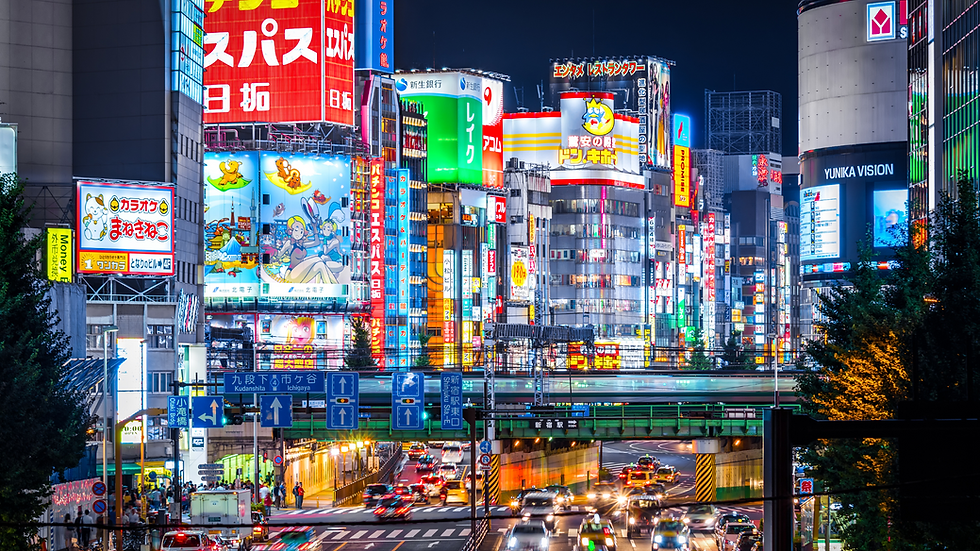How Bad Is Japanese Working Culture? A Native Perspective
- Ryoga
- Jul 29, 2023
- 4 min read
Updated: Dec 22, 2023

Japan, a country known globally for its advanced technology, unique culture, and rich history, has an equally infamous reputation when it comes to its work culture. The nation's work ethics, deeply ingrained and notorious for their intensity, often raise eyebrows on the international stage. This article aims to shed light on the realities of Japanese work culture from the perspective of someone who has experienced it firsthand - a native Japanese individual.
Excessive Hours of Working: Hours Matter, Not a Quality
In most parts of the world, the focus is on the quality of work produced. But in Japan, it seems the quantity of hours clocked in at the office holds more weight. This is a society where the 'work hard, not smart' mantra rings loud and clear.
My Working Experience in Japan
As a Japanese, I also experienced the worst possible working experience when I was a teenager. At my first full-time job, particularly during my teenage years. At my first full-time job, I clocked out at 5 p.m. daily, but my supervisor demanded more, asking, 'Why don't you work longer? Everyone here works overtime. Don't you want to earn more money?' Though I had completed my tasks by 5 p.m., the pressure to stay longer.
But I kept leaving work at 5 p.m. and even though I wanted money, if I worked 12 hours a day at that place, I would end up becoming like most of the dead-end workers there. That wasn't the future I desired.
If You Don't Work Longer You're Not a Good Worker
It's common knowledge that in Japan, hours are valued more than results. You could be the most productive worker in the room, but if you're not working overtime, you're not seen as a valuable asset. This unhealthy focus on quantity over quality is one of the major reasons why overwork is rampant in Japanese society. Ridiculous.
Karōshi Overworked to death
The term 'Karōshi' literally translates to 'overwork death,' a grim reality in Japan. It's not uncommon to hear stories of employees working well beyond the standard 8-hour workday. The regular standard is 8-5, making it all too easy to surpass 40 hours a month!
Working 60 Hours Extra
A friend of mine works an extra 60 hours per month without getting paid for overworking hours - Terrible! He deserves twice the pay.
Even when I advised him to seek legal counsel or find a better job, but fear of leaving his job held him back. After six years at that company, he received a meager raise, and the company's brainwashing tactics kept him trapped.
Manipulative Tactics By Companies: Company Manipulates Employees
Believe it or not, most companies in Japan employ such tactics. During my initial job training, the scenario was peculiar. I and other newcomers were folding Origami from 8-5 without rest. When someone dared to sit down, the supervisor yelled at that guy, 'Who told you to sit down?' Folding Origami was absolutely unrelated to our jobs, but the supervisor claimed there was meaning in it, wanting us to grasp some elusive lesson. He even asserted, 'If you quit, there is nothing better than this company.'
I couldn't bear it and swiftly quit. Far better opportunities exist elsewhere
Must Attend After-Work Events
After a long day of work, the last thing anyone wants is to spend their limited free time at work-related events. But in Japan, these events are almost mandatory. The frequency may vary from weekly to monthly, Superior invites employees to drink at the restaurant bar after work, on weekends, or even on holidays. What a waste of time! but their impact on your personal time is significant.
Refusing to attend these events can be seen as an act of defiance, potentially stunting your career growth. It's a subtle form of coercion that forces employees to sacrifice their personal time for the sake of maintaining a positive image at work.
It Doesn't Contribute to Career Success
Another friend of mine frequents these events, once or twice weekly, claiming they are 'fun and enjoyable.' Yet every time I see him, he complains that his work is tedious and realizes it's not the path he should tread. He's trapped, forced to cover for understaffing while denied opportunities for personal growth.
Pick Up The Phone Call Right Away
In this culture, prompt responsiveness to superiors is seen as a sign of dedication. Missing a call from your boss can be seen as a lack of commitment, adding another layer of stress to an already demanding work environment
During my first job as a construction laborer at 16, I missed my boss's call one day. When I called back, he snapped, 'You need to pick up every phone call immediately, don't miss it.' At that moment, I thought, 'I'll never thrive in this country.'
Can't Take Holidays
A mere 56.6% of Japanese workers manage to utilize all their holidays each year. It's slightly improved from past years, but still distressingly low. This is due to a combination of workplace pressure and a sense of guilt towards colleagues who have to cover their workload during their absence.
A friend of mine couldn't bear to take all his holidays last year, asked him why. He said "feeling guilty for his co-workers". ...I'm at a loss for words.
Conclusion
Japan's work culture, steeped in tradition and societal expectations, can be a tough pill to swallow for those accustomed to a more balanced work-life scenario. It's a culture that demands dedication but at the cost of personal health and happiness. While change is slowly occurring, it remains a long road ahead.
Don't work in Japan! Protecting your priority is most important, Japan is a nice country to visit but not for working.
Comments